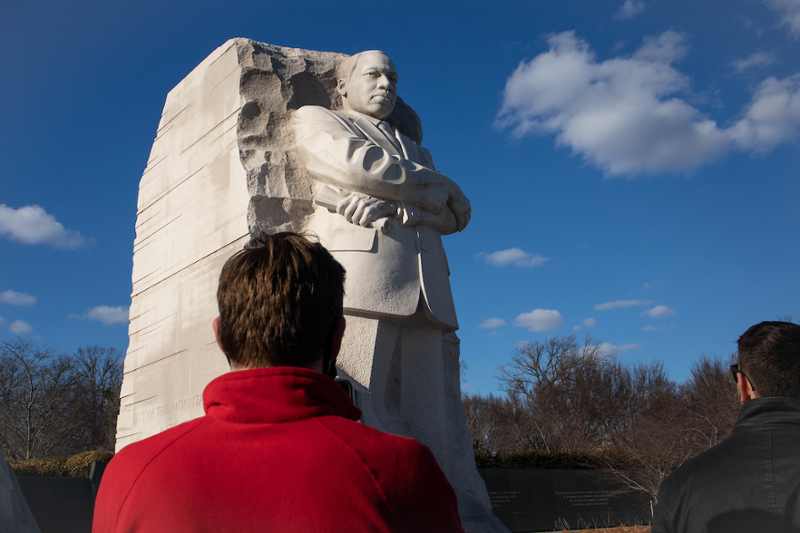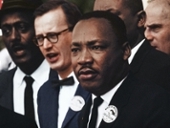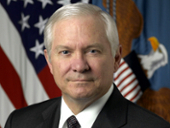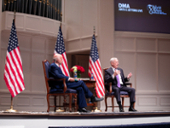Chaos or Community

Chaos! A foreign war with mounting casualties, economic disparity expanding across the nation, and a racial divide across our pulpits, local communities, and federal halls of government—these realities offer little hope for the promise of a triumphant future. Chaos!
The year was 1967—not 2023. Yet, these were the conditions in which our nation found itself and the context in which Reverend Martin Luther King Jr. wrote his consequential book, Where Do We Go From Here: Chaos or Community? Dr. King spent the last year of his life warning the nation of what he called the evil triplets: militarism, poverty, and racism. In King’s view, America had lost its focus to “redeem the soul of America.”
As early as 1965, King called for a withdrawal from the battlefields of the Vietnam War. His Sunday, April 4, 1967, speech entitled “Beyond Vietnam” was King’s most noted public objection to the war. The civil rights leader believed he had a “prophetic function” to share his views despite stringent objections from civil rights organizations. “My conscience leaves me no other choice,” King stated, as he believed the price being paid for the war was too high in terms of both lives lost and treasure spent.
King’s last public national campaign was the Poor People’s Campaign. Its goal was to demonstrate to the nation’s leaders and the country the growing cancer of abject poverty. Some argued that King’s ideas for this campaign were too lofty; others urged King to focus the civil rights agenda on the ballot box and the courts. Still others challenged King to do away with nonviolent direct action altogether and move to direct confrontation with those in power to force the issues of rights and justice once and for all.
King remained desperate to form a new “coalition of conscience,” a group of people from all backgrounds who wanted to make a positive difference and whose focus would be on the nation’s poor. He stated that poverty and social instability were not limited to African Americans. Puerto Ricans, Appalachians, Native and Mexican Americans were all among those in need. King gave a series of speeches in which he called for a guaranteed income for all Americans, including those too old, too young, or too disabled to work. He saw economic parity as a moral obligation to which America, as the wealthiest nation in the world, must respond.
The matter of racism, which King described as the black man’s burden and the white man’s shame, also remained a clear and present danger to the welfare of the nation’s soul. King was convinced that America was a house divided, even within the church. King argued that racism forged two hostile societies and served as a chief destructive force in social progress, which was evident within the nation he sought to change. King believed racism was a sickness that corrupted one’s moral and spiritual character.
War, Poverty, and Racism. The evil triplets: any one of these challenges create severe problems for a nation. But taken together, they have the potential to not only impede the progress of a civil rights agenda but to rob a nation of its very soul.
King never fulfilled his mission to rid the country he loved of war, poverty, and racism. On April 4, 1968, an assassin’s bullet took his life at the age of thirty-nine. Prior to his death, King, again and again, issued a clarion call to our nation’s leaders to help our country find its way forward. This call came in the form of a prophetic question—a question that remains today: Where Do We Go From Here: Chaos or Community?
King saw a nation in despair, a civil rights movement trying to regain its footing and a nation at a crossroads. He believed a “radical revolution of values” was needed to meet the challenges of the day.
Here in 2023, I am convinced a radical revolution of values is still needed. Today, we, too, are trying to find our way amidst similar challenges. We have made progress as a nation: There are no signs over restrooms marking “colored” or “white.” Schools, universities, Fortune 500 companies, the United States Congress, the military, and the White House are all comprised of individuals from diverse and storied backgrounds. Public accommodations, from libraries to government buildings, do not exclude people based on the color of their skin. We’ve seen progress in business, technology, education—all are more diverse now than at any other time in our nation’s history.
Yet, acts of racism are now synonymous with places and names: a church in Charleston, South Carolina; a rally in Charlottesville; a grocery store in Buffalo, New York; the streets of Minneapolis, Minnesota. We know the names of Breonna Taylor, George Floyd, Eric Garner, Walter Scott, and Tamir Rice—not for how they lived but for how they died and the aftermath of their deaths. These are the contemporary dark chapters in America’s story of racism.
Today, we do not have troops on foreign soil suffering major casualties in a distant land. The war in Ukraine is nearly 6300 miles away, but it has been brought to our doorstep. According to the United Nations, more than 14 million people have fled their homes; six million have left for neighboring countries, another eight million people are displaced inside Ukraine itself, and it is estimated that the U.S. will welcome up to 100,000.[1] King argued, “there is no such thing as a limited war; someone pays a price.” In 2022 alone, the U.S. sent over 50 billion dollars of weapons and humanitarian, financial, and military aid to Ukraine.[2] Our treasure and interests are front and center in a war being waged within just miles of our NATO allies. No U.S. troops are in harm’s way, but we see harm finding its way to innocent people within a country for which Americans share a deep affinity. The unspeakable toll of death, destruction, and despair has brought our nation and the world to appreciate the reality of what King said years ago, “we must narrow the gap between the proclamations for peace and the activities we take that disrupt peace.”
And then, too, there is the issue to which King gave his final days: the fight against poverty. Today, the average American has no more than $400 in savings, yet the exponential gains of the wealthiest 1% have only increased. Between March 18, 2020, and April 15, 2021—during the COVID pandemic, a time of great hardship for so many Americans—the combined wealth of U.S. billionaires increased by $1.6 trillion, a 55 percent increase. The nation’s wealth is concentrated in the hands of only a small percentage of people. As it stands, the economic future of our nation is morally unsustainable. King was adamant about his stance on poverty: “There is nothing new about poverty. What is new, however, is that we have the resources to get rid of it.”[3]
What are we to make of King’s legacy and how he confronted these issues years ago that remain with us today? What we do matters. What we say in this moment matters. How we communicate the scriptures matters. How we lead matters!
Leadership is advancing a vision and inspiring others to join you in designing a more beautiful future. “Leadership is the art of mobilizing others to struggle for shared aspirations.”[4] Leadership is the ability to move people beyond their physical, emotional, and spiritual capacities to create something beautiful. In 2023, we need moral leaders who can move us from here to there.
King’s aim was not merely removing signs marking “separate but equal” facilities but to lead the nation to fully embrace the “Beloved Community.” In the Beloved Community, “everything is the way God says it should be”—value is not determined by bloodline, economic status, or ethnicity but given by God. We recognize that we are all made in the Imago Dei, and the mark of sovereignty is love. The Beloved Community is synonymous with the teachings of a Rabbi from 1st century Palestine, teaching on the Kingdom of God. It is reconciliation and redemption. It is not simply desegregation but integration. It is hearts aligned in mutual respect and care for one another. It is a transformed and regenerated society.
There is a way forward, an answer to the question to the title of King’s book, “Where Do We Go From Here?”
Remain Curious. Practically speaking, this means asking questions and leaning into tough conversations, which are far more necessary than comfortable. Curiosity opens the possibility and promise of “the not yet”—of what can be. Where do we go from here? The word “HERE” is tied to reality, and for King, that reality was disturbing, turbulent, and filled with vitriol and disillusionment—it was the furthest thing from the beloved community. The word “WHERE” is having the boldness to challenge the status quo; it’s being, as King noted, “maladjusted.” There are some things, King argued, including poverty, bigotry, and violence, to which we should never become adjusted. Remaining curious forms a new reality: one not marred by fear, fatalism, feuds, or falsehoods but shaped and informed by faith, freedom, forward-thinking, and forbearance. We do that by listening, asking questions, gathering information, constructing--and then executing a plan with all deliberate speed.
Form a new “coalition of conscience.” This requires leadership. Where do we go from here? David Gergen, a presidential advisor to four presidents, recently said, “we are in a moral crisis; one that cries out desperately for leadership.”[5] Leadership must include finding common ground when we can: forming a new coalition of conscience, where the guiding ethics are compassion, decency, and empathy for those who sit across from us in places of worship, at the office, on college and university campuses, and in our communities. We have some heavy lifting to do, and as such, we must work together. King stated that our destinies are not singular; instead, they are tied together in an inescapable web of brother and sisterhood. “There’s an African proverb that says, ‘if you want to go fast, go alone, but if you want to go far go with others.’” Beloved Community is a journey worth the effort, but we must travel together.
Choose Community over Chaos. We can’t control everything happening around us, but we can control far more than we have thus far. It comes down to the choice between Chaos and Community.
Chaos is shortsighted and has the potential to cost the nation lost lives, treasure, and moral standing. Unlike choosing community, chaos may offer political points at the moment but little to no foundational truths that are beneficial to build our future. Chaos will have us stumble towards the future blinded by ego, with a reverence for temporary things that fluctuate by the day, instead of intrinsic values like honor, fidelity, integrity, and courage.[6]
Choosing community is difficult and requires what Jim Detert calls “competent courage.” Competent courage occurs when we accept not just the responsibility to act but the obligation to learn and continuously practice the skills that increase positive outcomes for ourselves and others.[7] Again and again, King chose community over chaos. From the start of the freedom and civil rights movement in the Montgomery Bus Boycott in 1955, his advocacy for jobs and freedom in The March on Washington in 1963, his walk on the Edmund Pettus Bridge in 1965, his conscientious objection to the Vietnam War, and his attempts to advocate for fair working conditions and pay on behalf of Memphis’s sanitation workers in 1968, Dr. Martin Luther King, Jr. chose community. He brought an unwavering belief in God and did so even in the face of danger to himself, ridicule from his friends, and scorn from his detractors.
And so, I exhort you: Remain curious, form a new coalition of conscience, and choose community over chaos. My prayer is that our answer to King’s question of chaos or community will evolve into a way of life that is fully embraced here in our own time. We must marshal our God-given talents, skills, passions, and fervent prayers to usher in our hopes and dreams. May we be found doing the heavy lifting and having the tough conversations while modeling the love of Christ. I urge you: don’t shrink back, don’t be indifferent, aloof, or reactionary, and don’t become cynical. Don’t grow weary in well doing, for in due season we will reap a harvest if we faint not.[8]
[1] Ben Fox, “US to Welcome Ukraine Refugees but No Longer through Mexico,” AP NEWS (Associated Press, April 21, 2022), https://apnews.com/article/russia-ukraine-putin-immigration-covid-health-3f7893e2f47f4024b07bd897caf305a9.
[2] Bianca Pallaro and Alicia Parlapiano, “Four Ways to Understand the $54 Billion in U.S. Spending on Ukraine,” The New York Times (The New York Times, May 20, 2022), https://www.nytimes.com/interactive/2022/05/20/upshot/ukraine-us-aid-size.html.
[3] Martin Luther King, “The Nobel Peace Prize 1964,” NobelPrize.org, accessed January 21, 2023, https://www.nobelprize.org/prizes/peace/1964/king/acceptance-speech/.
[4] James Kouzes and Barry Z. Posner, The Leadership Challenge, 2nd ed. (San Francisco, CA: Jossey-Bass, 1995).
[5] David Gergen, “David Gergen on the State of Our Democracy: ‘We Can't Continue on the Path We're on; It's Unsustainable.",” CBS News (CBS Interactive, May 8, 2022), https://www.cbsnews.com/news/david-gergen-on-the-state-of-our-democracy-hearts-touched-with-fire/.
[6] David Brooks, The Road to Character (New York, NY: Random House, 2016).
[7]Jim Detert, Choosing Courage: The Everyday Guide to Being Brave at Work. (Boston, MA: Harvard Business Review Press, 2021), p. xiii.
[8] Galatians 6:9
Marcus "Goodie" Goodloe, Ph.D. is Senior Fellow for Ethics and Justice Institute for Global Engagement at Dallas Baptist University.






